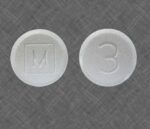Codeine
Showing all 4 resultsSorted by popularity
-

Generic Codeine 15 mg
$533.00 – $1,507.00 Select options This product has multiple variants. The options may be chosen on the product page -

Generic Codeine 60 mg
$548.00 – $1,519.00 Select options This product has multiple variants. The options may be chosen on the product page -

Codeine 300/30 mg
$548.00 – $1,519.00 Select options This product has multiple variants. The options may be chosen on the product page -

Generic Codeine 30 mg
$538.00 – $1,514.00 Select options This product has multiple variants. The options may be chosen on the product page
Codeine is used to treat moderate pain and it is also a narcotic pain reliever that is used to treat pain, cough, and diarrhea. Codeine belongs to the opiate (narcotic) analgesics and antitussive classes of medications. When codeine is used to treat pain, it alters the way the brain and nervous system react to pain. Codeine works to reduce coughing by decreasing activity in the part of the brain that causes coughing.
How to use Codeine?
- Codeine is available as a tablet, a capsule, and a solution (liquid) to take by mouth (alone or in combination with other drugs). It is generally given every 4 to 6 hours as needed. Follow your prescription label exactly, and ask your doctor or pharmacist to explain any parts you don’t understand. Take the codeine exactly as instructed.
- If this medication causes stomach upset, take it with food or milk. To help prevent constipation while taking this medication, drink 6 to 8 full glasses of water per day. Use a stool softener (laxative) only after consulting with your doctor.
- Don’t use a regular spoon; you may not get the right dose. If you are taking this medication in liquid form, use a special measuring spoon to carefully measure the dose. Shake the solution thoroughly before each use to ensure that it is mixed well.
- Don’t ever take Valium in high dosage or for a longer period without a doctor’s prescription.
- This medicine should not be given to those people who are addicted to drugs or alcohol.
- The initial dose for adults is 15 to 60 mg orally every 4 hours as needed, with a maximum dose of 360 mg in 24 hours.
What Do You Need to Know Before Taking Codeine?
- If you are allergic to codeine, any other medications, or any of the ingredients in the codeine product you intend to take, notify your doctor and pharmacist. Request a list of the ingredients from your doctor or pharmacist.
- If you are allergic to codeine, any other medications, or any of the ingredients in the codeine product you intend to take, notify your doctor and pharmacist. Request a list of the ingredients from your doctor or pharmacist.
- Before taking this medicine you have to take a doctor’s prescription. After that, you can use this medicine. Also, tell your doctor about your medical history If you have severe asthma or breathing problems, a blockage in your stomach or intestines, frequent asthma attacks, or hyperventilation.
- Do not give codeine to anyone under the age of 18.
- If you are breastfeeding, inform your healthcare provider. While taking codeine, you should not breastfeed. Codeine can cause shallow breathing, difficulty or noisy breathing, confusion, excessive sleepiness, breastfeeding difficulties, or limpness in breastfed infants.
- When you get up too quickly from a lying position, codeine can cause dizziness, lightheadedness, and fainting. When you first start taking codeine, this is more common. To avoid this issue, slowly get out of bed, resting your feet on the floor for a few minutes before standing up.
- Codeine can cause profound sedation, slow or stop your breathing, and may become habit-forming. Addiction, overdose, or death can result from the misuse of this medicine, especially in children.
Side effects of Codeine
If you have an allergy-like breathing problem, or swelling of your face, tongue, lip, or throat, seek emergency medical attention. Codeine, like other narcotic medications, can cause breathing problems. If breathing becomes too difficult, death may result.
Side effects from codeine are possible:
- Headache
- Stomach pain
- Difficulty urinating
In older adults or those who are underweight, overweight, or disabled, serious side effects may be more likely. If you have any serious symptoms immediately contact your doctor.
Serious side effects from codeine are possible:
- Noisy breathing, sighing, shallow breathing
- Slow heart rate or weak pulse
- Lightheaded feeling like you might pass out
- Confusion, agitation, hallucination, unusual thoughts or behavior
- Seizure
Long-term opioid medication use may impair fertility in both men and women. We do not know whether opioids’ effects on fertility are permanent.
How to Store codeine
- Keep it at room temperature 20 to 25 degrees Celsius and away from sources of extreme heat and moisture. the container must be tightly closed and out of the reach of children.
- Do not flush medications down the drain or pour them down the toilet unless it was directed by your doctor. Once this product has reached the end of its useful life or is no longer required, properly dispose of it. Consult your doctor or a waste disposal company in your area where to dispose of this medicine.
Drug interactions
Opioid medication can interact with a wide range of other drugs, resulting in dangerous side effects or death. Inform your doctor if you are using these medicines given below:
- Cold and allergy medications
- Motion sickness medications
- Other narcotic pain relievers
- Valium is a sedative medication.
- Drugs that cause drowsiness or slow breathing
- Serotonin reuptake inhibitors are medications that affect your body’s serotonin levels.
Overdose
If a person has overdosed and is facing severe difficulties seek medical attention. Otherwise, contact a helpline right away. While taking codeine, you should consult with your doctor about keeping a rescue medication called naloxone on hand. Naloxone is used to reverse the potentially fatal effects of an overdose. It relieves dangerous symptoms caused by high levels of opiates in the blood by blocking the effects of opiates.
These symptoms will occur if you take an overdose.
- Loss of muscle tone
- Fainting
- Slow heartbeat
- Difficulty breathing
- Excessive drowsiness or sleepiness
- Unable to respond or wake up
Frequently Asked Questions
If I miss a dose?
If you miss a dose take the medication as soon as possible, but skip the missed dose if your next dose is approaching. Do not take more than one dose at a time.
While taking Codeine what should I avoid?
Avoid consuming alcoholic drinks. Taking acetaminophen while consuming alcohol may increase your risk of liver damage. You must avoid driving or operating machinery because this medication has the potential to affect your thinking or reaction. Accidents can occur as a result of severe drowsiness.
How does codeine interact with the body?
Codeine works on your brain and nervous system to reduce your pain perception. Codeine relieves pain by weakly binding to a specific opioid receptor known as the mu-opioid receptor, but with much less affinity than morphine, implying that its pain-relieving effects are not as potent as morphine.
How Long Do You Have to Wait to Feel the Effects?
It usually takes about an hour after ingestion to start feeling the effects of the drug. Codeine alters the way your nervous system and brain detect pain and slows the activity in your brain that causes coughing, which is why it is used for both pain relief and cough suppression.
How to Remove Codeine from Your System?
To avoid unpleasant withdrawal symptoms, always consult your doctor before discontinuing a codeine prescription. Your doctor may decide to gradually wean you off the medication or switch you to a different type of pain reliever.
- The first step is to discontinue the use of the drug, which may be difficult if you have become physically dependent on it.
- Once you’ve safely stopped taking your medication, make sure to stay hydrated, eat healthily, and engage in regular physical activity, as these lifestyle changes may help speed up the rate at which the drug is cleared from your system.
How long does it stay in our bodies?
The half-life of codeine ranges from 2 1/2 to 3 hours. This means that half a dose of codeine will be eliminated from your system in about 3 hours. The liver is the primary metabolizer of codeine. The drug’s breakdown results in the formation of metabolites such as codeine-6-glucuronide, norcodeine, and morphine.
- Urine for up to 48 hours after their last drug use.
- It can be detected in saliva for up to 21 hours after the last time it was used.
- Hair can detect it for up to 10 weeks.
The detectability of codeine in anyone’s system can be affected by factors other than the type of drug test used.
- Metabolism is affected by age, gender, and ethnicity
- Weight
- Urine pH levels, kidney or liver disease
- Urine concentration can be influenced by fluid consumption
Is it legal to buy Codeine?
To Buy codeine online without a doctor’s prescription is essentially engaging in an illegal drug deal.
Do you need a prescription for Codeine?
Codeine is a prescription medicine. It is used to treat the symptoms of moderate to severe pain relievers.
In which mode do I get Codeine medicine?
Buy codeine medicine online with a simple mouse click. You can order this medication at a Newlifemedix at the cheapest rate. It is an approved and licensed medicine. They offer you a seamless shopping experience. We offer you discounts and also provide high-quality pills. Cash on delivery or home delivery on both modes we provide our services with free shipping depending on the location.
Can I pay for codeine with a credit card & debit card?
So, if you don’t want to pay cash for codeine, you can place an order with a debit or credit card.
